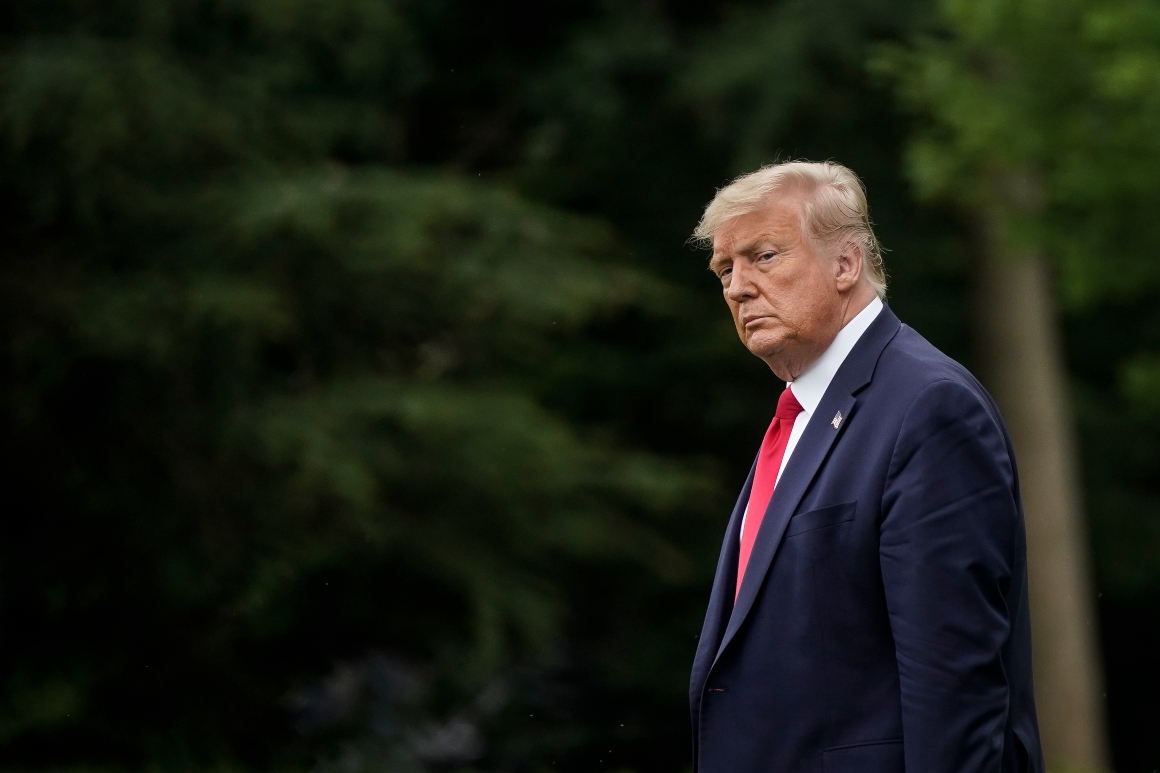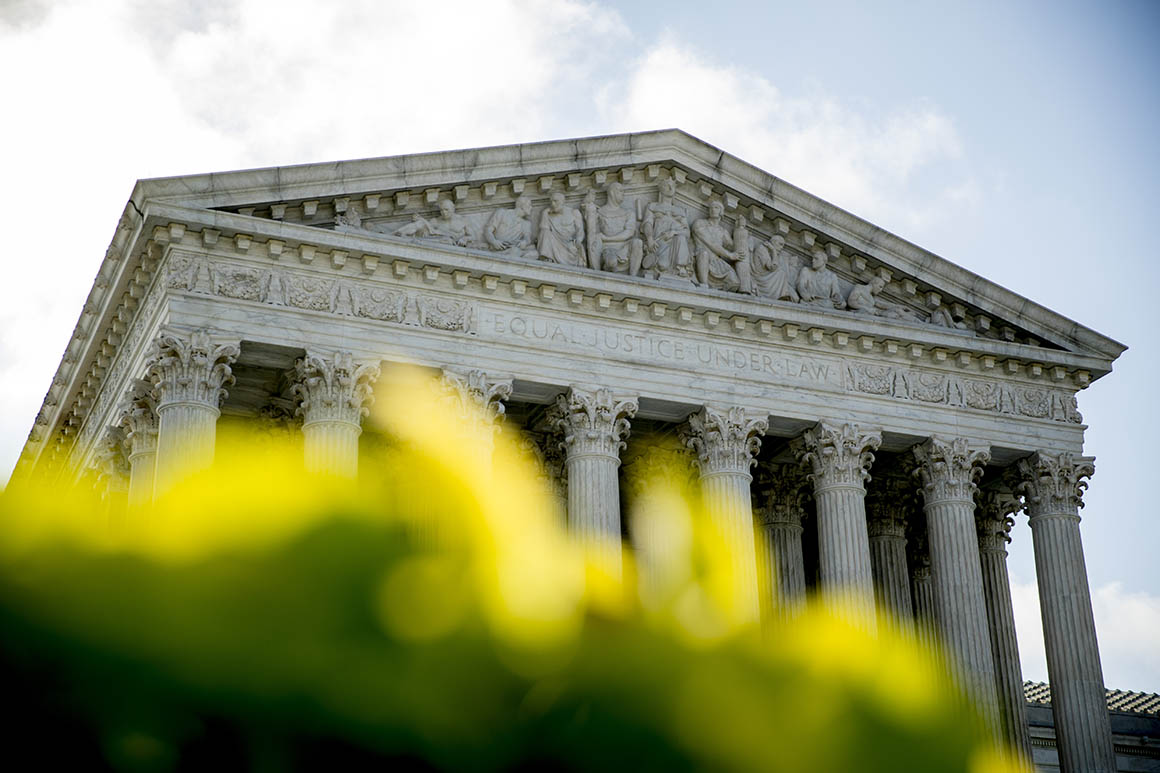
To give disgruntled conservatives a dash of hope after crushing Supreme Court losses on abortion and LGBTQ protections this summer, President Donald Trump made a promise: He would unveil a new list of reliably conservative jurists before presidential debate season kicked into high gear.
“I will only choose from this list,” he pledged in a tweet last month, describing it as “more important than ever” amid threats he and his supporters perceive against religious liberty, gun ownership and abortion restrictions.
The president’s tweet caught top White House aides and conservative legal figures off guard. But they quickly mobilized to review the existing 25 names and decide who should remain in contention, who should be removed and who might qualify as an acceptable addition. One month into the process, answering those questions has twisted some of Trump’s team into knots as the election quickly approaches.
While the president is hot to promote his Supreme Court list this fall – believing it will boost Republican turnout and remind religious conservatives what’s at stake as the nation’s culture wars flare — aides and outside advisers have become increasingly divided over its content and length. The standoff stems from recent concerns about Chief Justice John Roberts and Justice Neil Gorsuch — two Republican-appointed members of the high court who appalled party officials and conservative court watchers with their respective roles in two recent cases: one striking down a Louisiana law that would have dramatically curtailed abortion access, the other extending workplace discrimination protections to LGBTQ Americans.
Some want Trump to trim his list of potential Supreme Court candidates by half or more — ditching those with limited records from which to judge the consistency of their judicial philosophy and blocking fresh appointees to the federal court system from being added. Among the names they said Trump should keep are Judges Amul Thapar and Raymond Kethledge on the 6th U.S. Circuit Court of Appeals, both of whom have been on the federal bench for more than a decade, and Judge Amy Coney Barrett on the 7th U.S. Circuit Court of Appeals, a Catholic mother of seven who is widely revered among social conservatives despite her limited judicial record.

Two Republicans close to the White House Counsel’s Office, which continually vets potential judicial nominees, said Barrett should remain on the president’s list, but that Trump should resist calls to add more fresh faces from his record-setting list of appointees.
“There are few new judges who are very good and could be added to the list, but the main thing that needs to happen is to cut the list way down by removing anyone who has not been proven to be a rock-ribbed conservative,” said a third Republican close to the White House. “The whole purpose of the list is to give hardline conservatives a guarantee that we will not be betrayed again.”
“If the president wants to keep social conservatives, he needs to put out a much shorter list of the people who would actually receive real consideration for a vacancy in the next year.… A long list of 20 promising but unproven judges just isn’t good enough,” this person added.
But other prominent players in the conservative legal movement think an expanded list will only help the president if he wins reelection. Should vacancies arise, they have privately argued that a larger, more diverse pool is preferable to a short list of older candidates.
They also cite Gorsuch’s majority opinion in Bostock v. Clayton County — the landmark LGBTQ ruling in mid-June — as evidence that long records and prolific legal opinions aren’t always predictive of preferred outcomes.
“The problem with Bostock is that Gorsuch departed from a very clear record. He had 10 years on the appellate courts,” said Carrie Severino, policy director and chief counsel of the Judicial Crisis Network, a conservative advocacy group.
Severino, who has described Gorsuch’s opinion in Bostock as “an unprecedented betrayal,” said she expects the president’s updated list will omit older candidates previously identified as potential nominees and maintain a similar length. Substantive changes to the vetting process — including more specific questions about a candidate’s judicial philosophy — would likely occur if a vacancy arose during a second Trump term, she added.
“One thing I’m very excited about is seeing some of the new up-and-coming judges that President Trump put on the appellate bench, who are beginning to create that record so we understand their decisions, qualify for the Supreme Court list,” Severino said.
Frustrations among GOP base voters with the outcome of recent Supreme Court rulings, and division over identifying new candidates for future vacancies, are unlikely to stop Trump from campaigning on his judicial appointments this fall. Contributing to the angst among his supporters — which Trump is quietly tapping into — was the announcement this month that Justice Ruth Bader Ginsburg is undergoing chemotherapy due to a recurrence of cancer. Ginsburg, the Supreme Court’s 87-year-old liberal firebrand, said she remains able to work “full steam” following the diagnosis.
Those encouraging the White House to expand Trump’s Supreme Court list come September have circulated three Trump appointees — Kyle Duncan, Andy Oldham and Elizabeth “Lisa” Branch — as names they would like to see added. All three appellate court judges were confirmed by the Senate in 2018. Others say it’s not the list that needs to be changed, but the process of evaluating candidates before they’re even placed under serious consideration.
One of the more vocal critics of the current format, Sen. Josh Hawley (R-Mo.), told POLITICO last month he wasn’t “wild” about the president releasing a new list before the November election: “I don’t love the idea of just doing over what we have been doing in the past… When it comes to this whole process, we have to ask ourselves, is this vetting process, is this really working?”
The idea to release a new list caught fire inside the White House after the chief justice, Roberts, became the tie-breaking vote to block the Trump administration from immediately ending the Deferred Action for Childhood Arrivals Program, known as DACA, that has for years shielded young undocumented immigrants from deportation.
After a string of losses that upset conservative evangelicals in his base, the president viewed the key immigration ruling as a threat to his bond with non-religious Republicans as well, according to a person familiar with his thinking.
“He was always open to updating the list, but finally felt this was the right moment to do so,” this person said, noting that Trump’s 2020 opponent, former Vice President Joe Biden, has not yet committed to releasing his own list of potential Supreme Court nominees by a certain date.
Biden recently said his campaign was “putting together a list of African American women who are qualified and have the experience to be on the court,” but would not release their names “until we go further down the line in vetting them.”
Source: politico.com
See more here: news365.stream






